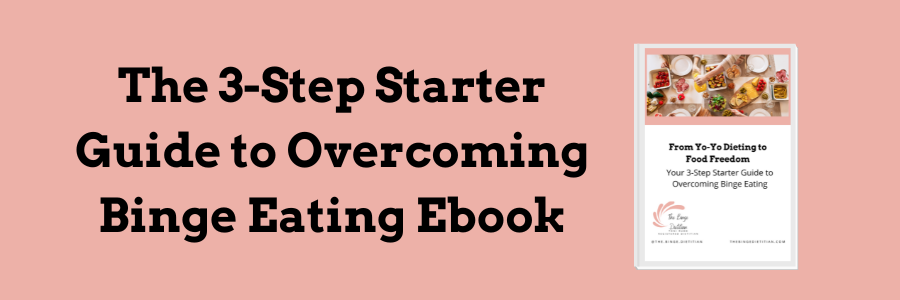7 Reasons Why You Should Avoid Fad Dieting
January often brings a wave of fad diets, promising quick fixes and transformation which will make you ‘healthier’ and most importantly, ‘happier’. For those caught in the cycle of binge eating, this time can be particularly challenging. Let's explore why steering clear of the January diet trap is crucial if you want to stop binge eating.
What is a fad diet?
A fad diet is an eating plan which often promises rapid weight loss, these diets focus on solely changing specific foods or eating patterns. They are seen as a “quick fix” and they tend to lack scientific backing. Dieting may inadvertently contribute to the cycle of yo-yo dieting, and binge eating behaviours, ultimately casting a shadow on mental and physical health.
The Glorified Binge Eating Cycle
From the celebrations of Thanksgiving through to the twinkling lights of Christmas, to the countdown and party poppers into the New Year, we often find ourselves amid a unique presentation of the binge eating cycle. Remarkably, this cycle seems more accepted within society during this time of the year.
This cycle involves a pattern of restriction, intense cravings, binge eating episodes, and overwhelming guilt and shame and can feel never-ending. For a more detailed exploration of this cycle, check out this blog.
‘New Year New Me’ Fad Craze
The start of a new year often means a fresh start for many people. By joining a gym, clearing out your closest and promising to take up positive behaviours like meditation, affirmations or mindfulness. But in January is very popular for dieting. Fueled by societal pressure to “undo” all the eating over the Holiday season. However, this culture often perpetuates unrealistic standards and can contribute to an erratic relationship with food.
7 Reasons Why FAD Dieting Doesn’t Work
1. Lack of Addressing Root Causes:
Quick fixes often focus on surface-level symptoms rather than addressing the underlying causes of binge eating or an unhealthy relationship with food. They might offer temporary relief, but without understanding and resolving the root issues, you’re likely to fall back into familiar patterns and weight regain is common.
2. Ignoring Emotional and Psychological Aspects:
Binge eating and food-related struggles are often deeply intertwined with emotional and psychological factors. Quick fixes tend to overlook these aspects, concentrating solely on weight as an outcome. Neglecting the emotional and psychological dimensions can lead you to a cycle of temporary success followed by relapse.
3. Unrealistic Goals & Expectations:
The allure of quick fixes often comes with unrealistic expectations. You may anticipate drastic changes in a short period, setting yourself up for disappointment and frustration when these expectations are not met. Having high expectations might lead to thoughts like “I'm useless”, “ I need more willpower”, or “Urgh, I ‘m never going to fit in that dress”! This cycle of high expectations is followed by a negative mindset.
4. Short-Term Focus, Long-Term Consequences:
Quick fixes prioritise short-term gains, often neglecting the long-term consequences. Rapid weight loss or other immediate results usually come at the expense of overall physical and mental health. Such as a reduced metabolism and just feeling hungry all the time. Sustainability and the maintenance of positive changes over time are key components often overlooked by fad diets.
5. Lack of Individualisation:
You’re unique, so what works for one person - or even a whole load of other people - may not be suitable for you. Quick fixes and fad diets often adopt a one-size-fits-all approach, disregarding the importance of individualised care. Tailoring interventions to a person's specific needs and circumstances is crucial for long-term success. That’s why working with a dietitian can be so beneficial.
6. Missing the Whole Picture:
A Whole Picture approach to health encompasses physical, emotional, and mental aspects. Fad diets tend to focus on isolated elements, solely focusing on weight loss. A more comprehensive understanding and approach are necessary for lasting positive change.
7. Potential for Health Risks:
Extreme dieting or the use of certain quick-fix or fad methods can pose health risks. From nutrient deficiencies to imbalances in metabolism, these approaches may jeopardise overall health, counteracting the intended benefits.
What to do Instead:
If you’re someone who has a tendency to pick up fad diets and you know that dieting is not the sustainable solution you’ve been seeking, then it's time to explore alternatives that benefit your long-term mental and physical health.
For more information, read this blog post about the alternative approaches to dieting.
Quick fixes or FAD diets may promise immediate results, but the reality is that they often fall short of addressing the root causes behind issues like binge eating and an unhealthy relationship with food. Instead, consider a holistic approach that goes beyond superficial solutions. Sound good? Let’s chat.
My Mission: Embracing a balanced and sustainable approach
At The Binge Dietitian, my mission is simple yet powerful: to help yo-yo dieters free themselves from binge eating and find lasting peace with food.
I am passionate about guiding you towards a healthier relationship with both your body and the food you consume. Together, we will set sustainable and realistic goals that support your overall physical and mental health.
Learn more about my 1:1 consultations and how they can empower you to break free from dieting and binge eating. Click here to explore my support services
Don't let dieting and binge eating control your life any longer. Contact me here to find out how I can support you.


